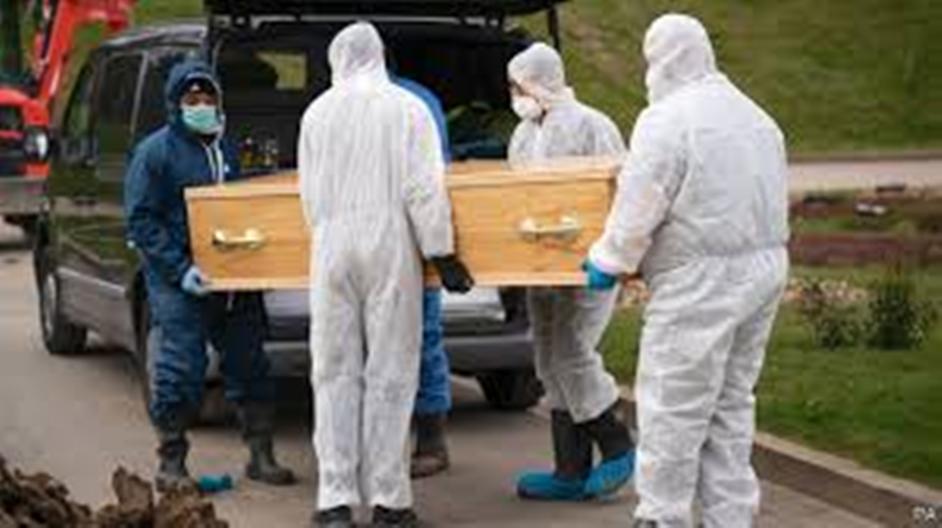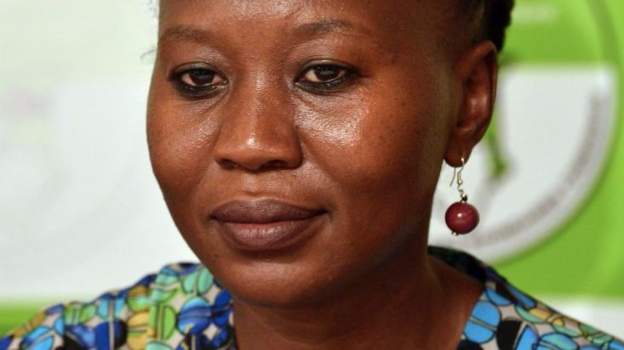Burial of COVID-19 victim in Namisindwa district/Courtesy photo
As Uganda continues battling community infections, some Ugandans have resorted to paying hospital and mortuary staff for negative coronavirus reports for their loved ones who have succumbed to the pandemic. This comes almost three months after the Health Ministry stopping conducting burials for COVID-19 victims due to lack of funds.
As a result, the bodies of the victims are handed over to their relatives for immediate burial in compliance with the Standard Operating Procedures-SOPs. According to the SOPs, the health officials are required to secure the body in a bag and place it in a coffin before handed over to the bereaved family for burial. However, some families that want to delay the funeral to carry out burial rights have resorted to paying for negative certificates.
One such family is that of Jospeph Sabiti. He lost his uncle on December 29, 2020 to COVID-19 at Mulago National Referral hospital following his referral from Kiriddu National Referral hospital. Due to disagreements between the family members on burial arrangements, Sabiti’s family paid Mulago hospital staff Shillings 200,000 to issue a negative COVID-19 death certificate.
“Some members of the family wanted to carry out burial rituals. The deceased being a Ssalongo (having fathered twins), they insisted on wrapping the corpse in backcloth and also keep the body for an extra day. They said a Ssalongo could not be buried on the day he dies,” Sabiti said.
Dr. Rose Byanyima, the Deputy Director of Mulago National Referral Hospital and head of the COVID-19 Treatment Unit, says they have received reports of people buying the negative COVID-19 postmortem reports and are looking into the matter. She notes that the practice is deplorable and unnecessary because the hospital records cannot easily be changed.
Another issue surrounding COVID-19 deaths is the issuance of confusing results. On August 20, Joyce Badaga lost her husband. Since her husband had been hypertensive and was suspected to have succumbed to COVID-19, he was buried on the same day following safe burial guidelines.
However, three days after the burial, the health ministry issued negative COVID-19 results. Badaga says she now moves around with the shame of her husband dying from a disease that he didn’t have in the first place.
“The way the burial was carried out, there was no way people would not know it was a COVID death. There were around six people in white handling everything. After people seeing that, how do you convince them it was not COVID-19? Some of our relatives do not want to be near us. They think we have COVID-19 even when none of us has tested positive for the disease,” Badaga said.
Another case involving a public health specialist Dr. David Katuntu that occurred in September 2020 raised the same issues. Katuntu, a known diabetic passed away but while the health ministry said he had succumbed to COVID-19, results of another postmortem out revealed that he didn’t succumb to the pandemic.
Dr. Joseph Matovu, a behaviour change specialist, says due to little sensitisation, many people do not know a lot about COVID-19 and as such are scared of any stigma that might be associated with the disease. “When a new disease comes up that people do not know about they react differently. During the peak of HIV, people would rather say their loved ones succumbed to witchcraft instead of HIV. They are scared of the stigma that might be associated with people knowing they have had a COVID death. So instead of taking the necessary precautions, people would rather risk their lives,” he said.
When asked about the two scenarios cited by our reporter, Dr. Charles Olaro, the director of curative services at the Ministry of Health says that it is unfortunate that people are paying to get negative COVID-19 postmortem results. He says while carrying out safe burials would be an ideal way to stop the practice but due to lack of funds, the health ministry can no longer carries out the burials.
“We cannot carry out the burials right now but what we are doing is to ensure that the body is wrapped well in a body bag and then we hand it over to family members for burial after we have disinfected the bag,” he said. While some health experts say there’s no need to carry out safe burials that are commonly associated with Ebola, clinicians involved in the management of the disease, say the opposite.
Dr. Byanyima insists on the need for precaution when handling COVID-19 bodies. “At the hospital, we take precautions to make sure that our staff at the mortuary or even family members do not come into contact with the bodies because are not sure whether the disease can be transmitted through body fluids. Some studies have suggested that the disease can be transmitted through stool. To keep safe, we advised all people to adhere to set burial protocols,” she said.
In an interview with the Commissioner in Charge of safe and dignified burials, George Okentho, told URN that the there’s no reason why people should be forging results since the bodies of people who have succumbed to COVID-19 are not infectious. “There’s no issue there because the bodies are not infectious and that is why safe burials were stopped. The moment we discovered that the disease is not contagious and the remains cannot spread the disease we stopped the burials,” Okentho said.
However, the World Health Organisation, says while there is little evidence to show that the disease can be passed on through the remains of an infected person, it is important to take precautions since little is known about the disease. Our reporter visited Mulago hospital mortuary early this week and found two ambulances that had come to pick bodies of people believed to have succumbed to COVID-19.
A security guard, who keenly follows the loading of coffins in the vehicles, said they can only allow the loading of the bodies once a COVID-19 certificate is availed. Burials surrounding COVID-19 have been the source of a lot of controversies.
-URN





